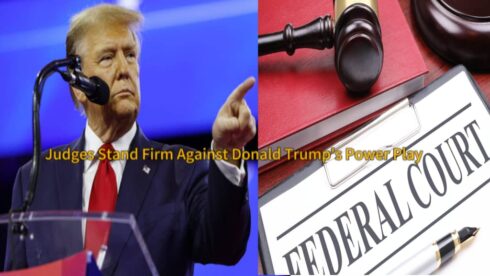U.S. President Donald Trump’s suffered a legal defeat as a federal appeals court rejected his administration’s attempt to override a lower court’s decision blocking his freeze on federal grants. The ruling marks yet another judicial blow to Donald Trump’s ongoing efforts to exert executive control over funding distribution.
In a sharply worded decision, the U.S. Court of Appeals for the 1st Circuit stated, “The defendants do not cite any authority in support of their administrative stay request or identify any harm related to a specific funding action or actions that they will face without their requested administrative stay.” The court’s refusal to comply with Donald Trump’s demands underscores the judiciary’s commitment to maintaining checks and balances against executive overreach.
Donald Trump’s DOJ Scrambles, Courts Remain Unmoved
Despite the ruling, Donald Trump’s Department of Justice (DOJ) rushed to seek intervention from Senate Minority Leader Mitch McConnell, urging him to push for a legislative solution. The DOJ’s plea included a complaint about the immediate unfreezing of funds, which the White House had sought to block as part of its broader financial strategy.
However, the courts remained steadfast, stating, “In these circumstances, we assume we have jurisdiction and deny the motion for an administrative stay without prejudice.” This rejection leaves Donald Trump with limited legal avenues to overturn the decision, exposing a widening rift between the judiciary and the executive branch.
Funding Battles Highlight Donald Trump’s Authoritarian Tactics
The dispute over federal grant disbursement highlights Donald Trump’s willingness to leverage government funding as a political weapon. The White House had sought to withhold grants from states and municipalities that opposed its policies, prompting accusations of authoritarian governance.
Critics argue that Donald Trump’s funding freeze was an attempt to punish political adversaries and coerce compliance with his administration’s agenda. The courts’ intervention not only restores financial stability to affected entities but also reinforces the principle that federal funds cannot be weaponized for political gain.
MAGA Movement Clashes with the Judiciary
Donald Trump’s MAGA base has reacted aggressively to the ruling, with many viewing it as an example of what they perceive as a politically motivated judiciary undermining their leader. Right-wing commentators have fueled the outrage, claiming that the courts are obstructing Donald Trump’s agenda to impose law and order through financial leverage.
On the other hand, legal experts and constitutional scholars maintain that the judiciary is merely upholding the law. They argue that allowing Donald Trump to unilaterally control federal funding would set a dangerous precedent, effectively giving the executive branch unchecked financial authority.
Elon Musk Joins the Fray, Attacks U.S. Courts
Billionaire Elon Musk, a vocal supporter of Trump, entered the debate by launching attacks against the judiciary on social media. Musk’s posts accused federal judges of being politically biased and resistant to “real change.” His comments have further inflamed tensions between Donald Trump’s supporters and the legal system.
Despite Musk’s rhetoric, legal analysts emphasize that the independence of the judiciary is vital to American democracy. The courts’ decision to rebuff Donald Trump’s funding freeze is a direct assertion of their role in preventing executive overreach, regardless of external political pressure.
The Future of Donald Trump’s Legal Battles
With this latest judicial defeat, Trump faces increasing difficulty in executing his policy agenda without legal resistance. While his administration will likely explore alternative legal maneuvers, the courts’ firm stance signals a continued battle between the judiciary and the executive branch.
As Donald Trump prepares for upcoming elections, legal setbacks like this could weaken his authority and fuel further political instability. Whether his administration finds new ways to circumvent judicial rulings remains to be seen, but one thing is clear—the courts are standing their ground against the president’s relentless power plays.














